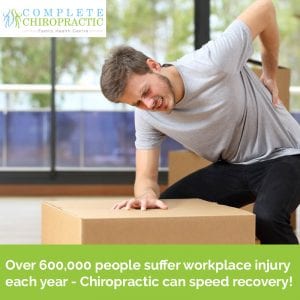Ok – yes, we’re a Chiropractic clinic, so of course, we’re going to recommend Chiropractic when you’ve been unlucky enough to suffer a workplace injury. It’s not all quite that simple though – new research has now shown that the “traditional” approach to dealing with workplace injury – that is to say, medication – may actually lead to longer periods of disability and more time off work. This week let’s take a look at workplace injury.
How common are workplace injuries anyway?
While most of us probably know someone who has experienced an accident or injury at work, you may not be aware of just how common these incidents are. For most of us, workplace injuries tend to mean a trip, fall or something impacting you – hopefully at not too a high a rate of speed! Serious injuries are thankfully quite rare – according to the health and safety executive, 144 workers were killed at work in 2015/16 – a tragic number, but very small considering the total number of people in the UK workforce. What’s more shocking however, we also know that there were an estimated 621,000 non-fatal injuries to workers were reported – equating to an astonishing 4.5 million estimated working days being lost. While you’re thankfully very unlikely to suffer a fatal accident at work, clearly your risk of a smaller incident it quite high!
There are several common forms of injury which bring people to our clinic – these include:
Slips, trips and falls
As above – we often associate these with manual handling type jobs, but slips trips and falls can take place almost anywhere. Most of us manage to land the right way up when we fall – but as you might have guessed its often the spine which takes the brunt of the force from landing.
Muscle strains
Strained and otherwise injured muscles are common in almost every workplace – yes, builders, warehouse operatives and gym instructors need to be particularly careful, but a huge number of muscular injuries are caused each year by poor posture – you’re reading this on an electronic device right now, how’s your posture?!
Repetitive strain injury
RSI is a problem that’s become increasingly common at work over the years and can be caused by a variety of tasks, such as forceful or repetitive activity, or again – by poor posture.
The condition mostly affects parts of the upper body, such as the forearm, elbow, wrist, hands, shoulders and neck. The cumulative impact of RSI can be severe in some cases, so it makes sense to take precautions.
Crashes and collisions
Accidents resulting in crash or impact injuries are quite frequent – they are usually just small incidents, but only a small impact is required to cause complications such as whiplash. It’s also possible to be injured by driving a vehicle in rough conditions over uneven ground, this can take a real toll on your neck.
How can you treat a workplace injury?
Like any injury, severe pain, bleeding or other complication requires treatment from a medical professional – but much of the time a workplace injury such as RSI, or muscular issue won’t manifest as a serious complaint of the sort which demands urgent care – instead you’re often left with pain ranging from a dull ache to a sharp pain when you move the affected area.
In dealing with these kinds of problems, there are two main routes to go down – the first is medication, the second is some form of physical therapy, of which chiropractic is one of the most well regarded, especially for these kinds of complaints. The second option is medication, which is usually the option of choice for the GP. Depending on the nature and severity of the pain involved, the medications on offer typically include opioids, non-steroidal anti-inflammatory drugs (NSAIDs) and skeletal muscle relaxants (SMRs).
Medication: new research
While medication certainly can be a useful stop-gap measure (and we certainly wouldn’t advocate ignoring your doctors advise) it’s certainly the case that medication comes with side effects. For short term usage these are not usually severe, however in instances where longer-term usage is required. Perhaps the bigger problem with medication though is the question as to its actual effectiveness.
Fundamentally, medication for pain does nothing to resolve the underlying complaint – it simply reduces the discomfort you are experiencing while your body tries to resolve the issue. Chiropractic or similar approaches actually aim to resolve the underlying problem thereby taking a proactive approach – but new research suggests that medication, rather than just failing to address the root cause of pain, may actually be counterproductive.
A 2019 study[1] which has examined workers claiming short term disability compensation, following workplace accidents resulting in lower back pain between 1998 and 2009. Minimum eligible age was 18 years and injury date, of course, had to equal or precede claim registration date. Using the case notes for these patients, researchers came to some very interesting conclusions.
Firstly, the study showed that the use of opioids early on in treatment led to prolonged work disability compared with NSAIDs and SMR’s. Secondly and perhaps most importantly, it was demonstrated that while the use of opioids had the “worst” effect, longer usage of all the drug classes were also associated with increases work disability – meaning that in the long term, medication usage may even be counterproductive.
Treating workplace injuries- a better option
While medication might be a short term answer – after all, there’s no medal for short term suffering – research does suggest that a proactive treatment method which reduces pain without relying on medication is the best option for sufferers of workplace injuries.
Chiropractic is just such an option – and for lower back pain is perhaps the most well-known approach – for a reason! For acute injuries, our sports therapists are ideally positioned to help you recover faster. Perhaps more importantly though, long term chiropractic care can assist us all in maintaining optimal posture and proper range of movement, which in turn reduces the chance of injury in the first place. Research has confirmed that you are considerably more likely to suffer a low back injury if your posture is already a problem![2]
Have you suffered a workplace injury? Don’t suffer in silence, give us a call today – take advantage of our new patient special and well have you on the road to recovery before you know it.
[1] Nancy Carnide, Sheilah Hogg-Johnson, Mieke Koehoorn, Andrea D Furlan1, Pierre Côté, Relationship Between Early Prescription Dispensing Patterns
and Work Disability in a Cohort of Low Back Pain Workers’ Compensation Claimants: A Historical Cohort Study Occup Environ Med. 2019 (May 15)
[2] Arch Phys Med Rehabil/ 2002;83 :48-59

